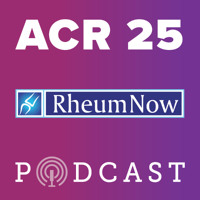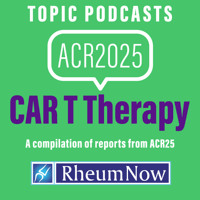General Rheumatology
On the final day of ACR25, late-breaking abstract #24 drew particular attention, presenting results from the first positive Phase 3 trials of a potential systemic treatment for a disease that has long lacked one.
Sjögren's disease has been a difficult space for new FDA approvals. At ACR 2025, two late breaking abstracts have triggered hope for patients suffering from Sjögren's disease.
Drs. Jack Cush & Arthur Kavanaugh, two of rheumatology’s most trusted voices, provide a breakdown of the latest breakthroughs and hottest topics in rheumatology from the 2025 ACR Convergence meeting in Chicago.
Here's the last installment of our "ACR Best" abstracts as chosen by the RheumNow faculty. Most of these were from the final, day 4, but a few were noteworthy holdovers from day 3. Enjoy!
IgG4 is a rare autoimmune disease with excessive IgG4 immunoglobulins that can affect multiple organs yielding plasma cell deposition (inflammation) and fibrosis.There has been great progress in treatment. Traditionally, glucocorticoids were used and if ineffective, then an oral immunesuppressive (ex: Azathioprine, MMF) and, if needed, rituximab. Many patients can improve sufficiently on this regimen.
My favorite session at ACR Convergence is often the “Great Debate.” The debate this year also evaluated one of my favorite topics – ultrasound in giant cell arteritis (GCA). More specifically, it asked the question of whether biopsy or ultrasound should be the preferred modality for diagnosing GCA.
Methotrexate (MTX) remains the cornerstone of rheumatoid arthritis (RA) treatment, yet it remains unclear as to how to predict who will respond to it. Two studies presented at ACR (Abstracts 2639 and 2643) suggest the answer may be hiding in the gut.
At ACR 2025, the session “27M02: Nutrition for Rheumatic Disease: Where Aging Biology, Sarcopenia, and Diet Intersect” invited the audience to view rheumatic disease through the lens of biological aging and to consider how nutrition and exercise can serve as integrative lifestyle interventions.
Two new studies presented this year tackle a key question: can our initial treatment choices influence who ends up in the difficult-to-treat category?
As the population ages globally, rheumatologists are caring for an increasingly older patient population more than ever before. In RA alone, nearly 40 percent of patients are now aged 65 years or older. Yet the evidence guiding our treatment decisions continues to come from studies that rarely include them, giving rise to a fundamental question: do we really know how best to treat older adults with rheumatic diseases?
The GLP-1 story has been hard to miss this year, and at ACR Convergence, it’s clear that these drugs are starting to make real waves in rheumatology. Across multiple abstracts, investigators have used a large real-world dataset, the TriNetX network, to explore how GLP-1 receptor agonists (GLP-1RAs) might influence cardiovascular, renal and immune-mediated outcomes in our patients.
At ACR Convergence 2025, new research explored critical disparities and epidemiologic trends shaping outcomes in autoimmune rheumatic diseases across diverse populations and age groups. Studies presented at the meeting highlighted issues ranging from kidney transplant outcomes in lupus to medication disparities in rheumatoid arthritis and demographic patterns in systemic sclerosis and axial spondyloarthritis.
Artificial intelligence isn’t a distant frontier anymore. It’s here, and it appears able to detect signs of rheumatoid arthritis, possibly before we can clinically detect it. Two studies presented at this year’s ACR meeting highlight just how close we may be to a future where algorithms flag disease before we can and monitor activity with minimal patient burden.
At ACR Convergence 2025, the American College of Rheumatology presents new research illuminating critical challenges and advances in pregnancy outcomes for women living with rheumatic diseases, including axial spondyloarthritis, antiphospholipid syndrome, and lupus.
Fatigue is one of the most disabling symptoms in psoriatic arthritis (PsA), yet its causes are often underexplored. At ACR 2025, Abstract #0549, a possible hidden contributor was studied: obstructive sleep apnea (OSA).






















 Poster Hall
Poster Hall